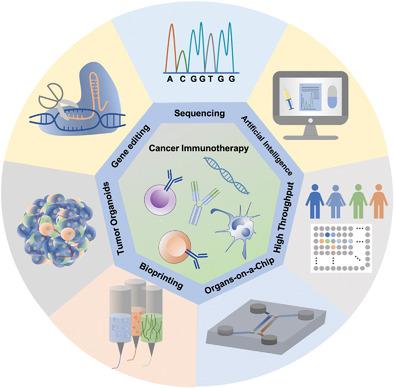Our official English website, www.x-mol.net, welcomes your feedback! (Note: you will need to create a separate account there.)
Screening Cancer Immunotherapy: When Engineering Approaches Meet Artificial Intelligence
Advanced Science ( IF 15.1 ) Pub Date : 2020-08-13 , DOI: 10.1002/advs.202001447 Xingwu Zhou 1, 2, 3 , Moyuan Qu 1, 2, 4 , Peyton Tebon 1, 2 , Xing Jiang 1, 2, 5 , Canran Wang 1, 2 , Yumeng Xue 1, 2 , Jixiang Zhu 1, 2, 6 , Shiming Zhang 1, 2 , Rahmi Oklu 7 , Shiladitya Sengupta 8 , Wujin Sun 1, 2 , Ali Khademhosseini 1, 2, 3, 9, 10, 11
Advanced Science ( IF 15.1 ) Pub Date : 2020-08-13 , DOI: 10.1002/advs.202001447 Xingwu Zhou 1, 2, 3 , Moyuan Qu 1, 2, 4 , Peyton Tebon 1, 2 , Xing Jiang 1, 2, 5 , Canran Wang 1, 2 , Yumeng Xue 1, 2 , Jixiang Zhu 1, 2, 6 , Shiming Zhang 1, 2 , Rahmi Oklu 7 , Shiladitya Sengupta 8 , Wujin Sun 1, 2 , Ali Khademhosseini 1, 2, 3, 9, 10, 11
Affiliation

|
Immunotherapy is a class of promising anticancer treatments that has recently gained attention due to surging numbers of FDA approvals and extensive preclinical studies demonstrating efficacy. Nevertheless, further clinical implementation has been limited by high variability in patient response to different immunotherapeutic agents. These treatments currently do not have reliable predictors of efficacy and may lead to side effects. The future development of additional immunotherapy options and the prediction of patient‐specific response to treatment require advanced screening platforms associated with accurate and rapid data interpretation. Advanced engineering approaches ranging from sequencing and gene editing, to tumor organoids engineering, bioprinted tissues, and organs‐on‐a‐chip systems facilitate the screening of cancer immunotherapies by recreating the intrinsic and extrinsic features of a tumor and its microenvironment. High‐throughput platform development and progress in artificial intelligence can also improve the efficiency and accuracy of screening methods. Here, these engineering approaches in screening cancer immunotherapies are highlighted, and a discussion of the future perspectives and challenges associated with these emerging fields to further advance the clinical use of state‐of‐the‐art cancer immunotherapies are provided.
中文翻译:

筛查癌症免疫疗法:当工程方法遇到人工智能
免疫疗法是一类有前景的抗癌治疗方法,由于 FDA 批准数量激增以及证明疗效的广泛临床前研究,最近引起了人们的关注。然而,进一步的临床实施受到患者对不同免疫治疗剂反应的高度可变性的限制。目前这些治疗方法没有可靠的疗效预测指标,并且可能会导致副作用。其他免疫治疗方案的未来发展以及患者对治疗的特异性反应的预测需要先进的筛查平台与准确和快速的数据解释相关。从测序和基因编辑到肿瘤类器官工程、生物打印组织和芯片器官系统等先进的工程方法,通过重建肿瘤及其微环境的内在和外在特征,促进了癌症免疫疗法的筛选。高通量平台的开发和人工智能的进步也可以提高筛选方法的效率和准确性。在这里,重点介绍了这些筛选癌症免疫疗法的工程方法,并讨论了与这些新兴领域相关的未来前景和挑战,以进一步推进最先进的癌症免疫疗法的临床应用。
更新日期:2020-10-07
中文翻译:

筛查癌症免疫疗法:当工程方法遇到人工智能
免疫疗法是一类有前景的抗癌治疗方法,由于 FDA 批准数量激增以及证明疗效的广泛临床前研究,最近引起了人们的关注。然而,进一步的临床实施受到患者对不同免疫治疗剂反应的高度可变性的限制。目前这些治疗方法没有可靠的疗效预测指标,并且可能会导致副作用。其他免疫治疗方案的未来发展以及患者对治疗的特异性反应的预测需要先进的筛查平台与准确和快速的数据解释相关。从测序和基因编辑到肿瘤类器官工程、生物打印组织和芯片器官系统等先进的工程方法,通过重建肿瘤及其微环境的内在和外在特征,促进了癌症免疫疗法的筛选。高通量平台的开发和人工智能的进步也可以提高筛选方法的效率和准确性。在这里,重点介绍了这些筛选癌症免疫疗法的工程方法,并讨论了与这些新兴领域相关的未来前景和挑战,以进一步推进最先进的癌症免疫疗法的临床应用。



























 京公网安备 11010802027423号
京公网安备 11010802027423号